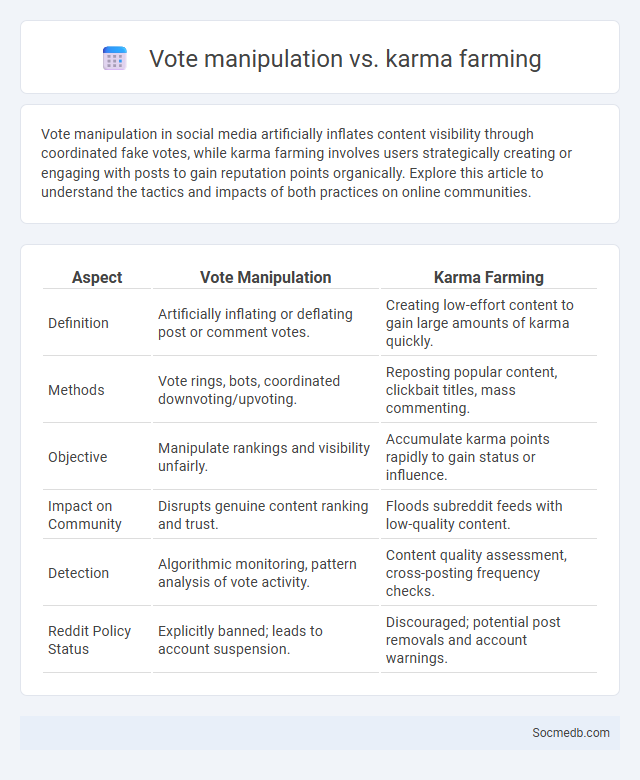
Photo illustration: vote manipulation vs karma farming
Vote manipulation in social media artificially inflates content visibility through coordinated fake votes, while karma farming involves users strategically creating or engaging with posts to gain reputation points organically. Explore this article to understand the tactics and impacts of both practices on online communities.
Table of Comparison
| Aspect | Vote Manipulation | Karma Farming |
|---|---|---|
| Definition | Artificially inflating or deflating post or comment votes. | Creating low-effort content to gain large amounts of karma quickly. |
| Methods | Vote rings, bots, coordinated downvoting/upvoting. | Reposting popular content, clickbait titles, mass commenting. |
| Objective | Manipulate rankings and visibility unfairly. | Accumulate karma points rapidly to gain status or influence. |
| Impact on Community | Disrupts genuine content ranking and trust. | Floods subreddit feeds with low-quality content. |
| Detection | Algorithmic monitoring, pattern analysis of vote activity. | Content quality assessment, cross-posting frequency checks. |
| Reddit Policy Status | Explicitly banned; leads to account suspension. | Discouraged; potential post removals and account warnings. |
Introduction: Understanding Vote Manipulation and Karma Farming
Vote manipulation undermines the integrity of social media platforms by artificially inflating likes, upvotes, or reactions through coordinated efforts or automated bots. Karma farming involves users strategically posting content designed to gain quick approval and increase their standing within the community, often without contributing meaningful interactions. Understanding these practices helps you recognize inauthentic engagement and promotes more genuine social media experiences.
Defining Vote Manipulation: Tactics and Techniques
Vote manipulation on social media involves artificially influencing user engagement metrics such as likes, shares, and votes to distort public opinion and visibility. Common tactics include coordinated bot activity, fake accounts, and algorithmic exploitation to amplify specific content unfairly. These techniques undermine authentic interaction and can skew trends, recommendations, and decision-making processes on platforms like Facebook, Twitter, and Reddit.
What is Karma Farming? Key Concepts Explained
Karma Farming refers to the strategic creation and sharing of content designed to attract upvotes, likes, or positive interactions on social media platforms, especially Reddit. This practice exploits popular themes, trends, or emotionally engaging topics to boost your visibility and social credibility. Understanding Karma Farming helps you optimize content engagement and grow your online presence effectively.
Vote Manipulation vs Karma Farming: Core Differences
Vote manipulation on social media involves artificially inflating or deflating engagement metrics like upvotes or likes through bots or coordinated efforts to skew perception. Karma farming, in contrast, focuses on consistently posting content designed to gain approval and accumulate positive feedback naturally over time. Understanding these core differences is essential for platform integrity and identifying genuine user influence versus deceptive tactics.
Motives Behind Vote Manipulation on Online Platforms
Vote manipulation on social media platforms often stems from motives such as amplifying misinformation, swaying public opinion, and boosting engagement metrics artificially. Malicious actors exploit algorithmic vulnerabilities to create false consensus, misleading Your perception of popular opinions or trends. Understanding these tactics is crucial for recognizing authentic user feedback and maintaining the integrity of online interactions.
The Impact of Karma Farming on Community Trust
Karma farming on social media undermines community trust by prioritizing superficial engagement over genuine interaction, leading to a decline in authentic content. This practice inflates perceived social validation, creating a feedback loop that distorts user expectations and weakens the integrity of online relationships. Studies show that communities with high levels of karma farming experience reduced user retention and lower overall platform credibility.
Detection Methods: Spotting Vote Manipulation and Karma Farming
Detection methods for vote manipulation and karma farming on social media platforms utilize advanced algorithms and machine learning to identify abnormal voting patterns and repetitive account behaviors. Tools analyze metadata, such as IP addresses, timestamps, and user interaction histories, to detect coordinated campaigns aimed at artificially inflating post popularity or user reputation. By monitoring these signals, platforms help protect the integrity of your content engagement and maintain a fair digital environment.
Platform Policies: How Sites Combat Manipulative Behaviors
Social media platforms implement strict content moderation policies to detect and remove manipulative behaviors such as misinformation, fake accounts, and coordinated inauthentic activity. Advanced algorithms and machine learning models are employed to identify suspicious patterns, while human moderators review flagged content to ensure compliance with community standards. Transparency reports published by companies like Facebook, Twitter, and Instagram reveal ongoing efforts to improve platform security and reduce manipulation risks.
Ethical Implications: The Gray Area of Online Reputation
Navigating the ethical implications of social media requires understanding the gray area of online reputation, where misinformation and privacy breaches can significantly damage Your digital identity. Platforms often struggle to balance freedom of expression with the need to prevent defamation, harassment, and the spread of harmful content. You must be discerning in managing your online interactions to protect both Your reputation and the ethical standards of the digital community.
Conclusion: Addressing Vote Manipulation and Karma Farming
Addressing vote manipulation and karma farming is crucial for maintaining the integrity of social media platforms and fostering genuine user engagement. Implementing advanced algorithms to detect fraudulent activity and promoting transparent community guidelines can significantly reduce unethical practices. Protecting your online reputation ensures a trustworthy environment where authentic content thrives.
 socmedb.com
socmedb.com